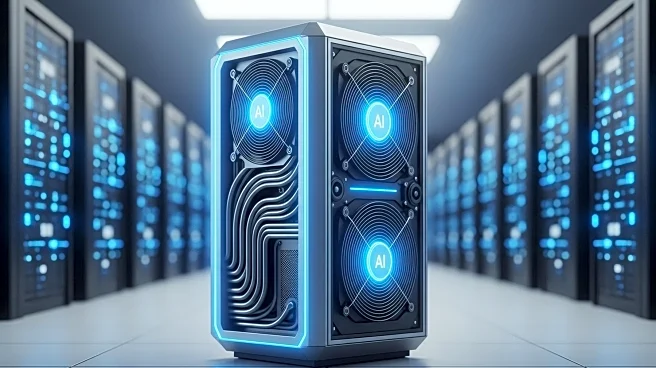What's Happening?
Nvidia CEO Jensen Huang has announced a significant rise in demand for AI computing over the past six months. Speaking on CNBC's 'Squawk Box,' Huang highlighted the exponential growth in computing power required by advanced AI models, which are evolving from simple question-answering to complex reasoning tasks. This surge in demand has positively impacted Nvidia's stock, contributing to a 2% rise and boosting the Nasdaq Composite. Huang emphasized the high demand for Nvidia's advanced graphics processing unit, Blackwell, and described the current phase as the beginning of a new industrial revolution. Nvidia plans to invest $100 billion in OpenAI's data center expansion, which aims to build 10 gigawatts of data centers using Nvidia chips.
Why It's Important?
The increase in demand for AI computing signifies a pivotal moment for the technology industry, potentially leading to significant advancements in AI capabilities. This growth could drive innovation across various sectors, including consumer electronics, connected vehicles, and smart manufacturing. The U.S. stands to benefit from this demand surge, although Huang noted that China is advancing rapidly in terms of energy infrastructure to support AI development. The need for substantial power generation to fuel AI ambitions raises questions about energy sustainability and infrastructure development, with potential implications for electricity prices and environmental impact.
What's Next?
As the AI industry continues to expand, companies may need to explore alternative energy sources to meet the growing power demands. Huang suggested that data centers could be equipped with natural gas and potentially nuclear power to accelerate development and mitigate rising electricity costs. The competition between the U.S. and China in AI development may intensify, with both nations striving to enhance their technological capabilities and energy infrastructure. Stakeholders in the AI industry will likely focus on securing the necessary resources and partnerships to sustain growth and innovation.
Beyond the Headlines
The rapid growth in AI computing demand raises ethical and environmental considerations, particularly regarding energy consumption and sustainability. The industry's reliance on substantial power generation could lead to increased scrutiny of its environmental impact and the need for responsible energy management. Additionally, the expansion of AI capabilities may prompt discussions about the ethical use of AI technologies and their implications for privacy, security, and societal norms.











